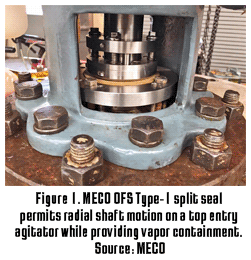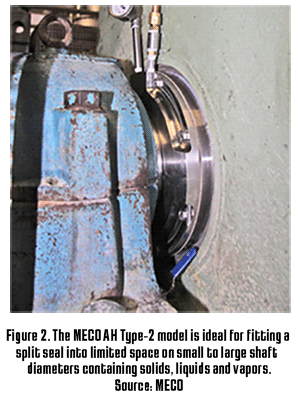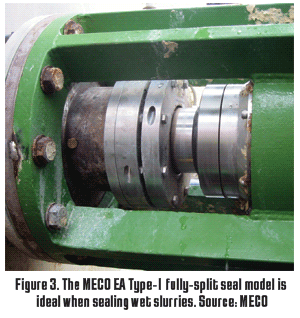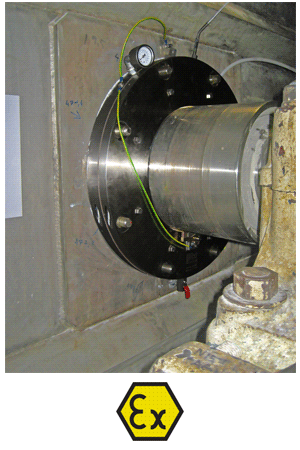Cost Savings In Process Environments

Cost Savings in Process Environments with MECO
Split Seals
18 December 2017
Sponsored content
Mechanical seals are more than 100 years old, originating in 1905 when they were used in refrigeration compressors. Seals today contain, withstand, accommodate and survive a rotating shaft in a closed or confined space. The rotating shaft is necessary to transform raw ingredients into value-added, marketable products such as plastic, medicine, corn chips, floor grout, soup, soap and RTV silicone.
Within today’s process environments, machinery is large and complex. Traditional seals often require the disassembly of large machines just to install them—a labor-intensive process that causes downtime and a corresponding hit to the bottom line. A fully split seal, in comparison, eliminates the need to remove the bearing or drive transmission, saving time, eliminating radical disassembly and re-assembly and reducing expensive downtime. They also maintain the integrity and strength required for a particular application.
Split Rotating Shaft Seals
Both split and un-split sealing devices are manufactured from a variety of stainless steels, bearing grade plastics and elastomers. Split seals axial lengths vary from 2 to 10 in. long and shaft diameters vary from 0.75 to 27 in. Whereby un-split seals are common on Conveyor Equipment Manufacturers Association (CEMA) standard-sized screw conveyors and on bucket elevators, split seals are most often sized for use in any process industry equipment where a rotating shaft requires a seal.
A variety of process environments need split seals and many materials are used to create them. From bearing-grade plastics such as PEEK- or PTFE-based polymers, to specialty alloy metals or typical austenitic stainless steel grades and elastomers, there are a variety of choices specific to applications. In addition to the mechanical performance, chemical and thermal compatibilities are reviewed to identify the best materials for individual component construction. Applications include, but are not limited to:
• Bulk material handling
• Dry powder processing
• Food production (wet and dry)
• Pharmaceuticals
• Plastics and additives
• Pulp, paper and building products
• Vacuum drying
• Wet slurry treatment
Questions to be considered include: How much room is around and along the shaft? Is there a bearing or a drive assembly in the way? For end users, considerations include:
• Available space
• How a seal must operate within that space
• What does the design require as to temperature, pressure, speed and size or shaft diameter
Split Seal Examples
While there are more than a dozen existing split seal designs offered by MECO Seals in addition to their custom designs, here are three examples of split seals and how they are used.

MECO’s OFS Type-1 split seal is used in top-entry agitators, crystallizers, dryers, pan mixers, blenders, hoppers and similar rotating equipment in the production of plastic resins and additives, VOC vapors and fumes, crystal sugar, industrial chemicals and fermentation processes. The OFS Type-1 is used with top-entering and horizontal shafts. The seal keeps process materials inside the vessel and prevents atmospheric oxygen from entering the vessel.

The MECO AH Type-2 is a double mechanical seal that uses an elastomer drive to rotate bearing-grade synthetic seal faces against fixed, stainless steel seal faces. A barrier fluid pneumatically loads the seal faces and isolates the process from the atmosphere. Suitable for MRO and OEM equipment, the seal is used on horizontal, inclined and vertical shafts. Applications include blenders, bucket elevators, polymer extruders and both ends of a screw conveyor. The MECO AH Type-2 seal model is custom-designed and built to order. Shaft diameters range from 0.75 (18 mm) to 20 in. (500 mm) and all sizes in between.
A typical space requirement is 2.5 in. (65 mm) around the shaft and 4 in. (100 mm) along the shaft for easy split seal installation; smaller values are possible.

When axial or linear space is limited, the MECO EA Type-1 model is used and can be found in such process industries as pulp and paper, home building products, sewage and water treatment and biomass and ethanol production, along with other processes handling water slurries. They are frequently selected for side-entry mixers containing drywall or sheetrock mud. The entire assembly is fully split and serviceable onsite. These are three examples of MECO split seals, out of more than a dozen varieties of un-split and fully-split seals available.
Why MECO?
MECO is a manufacturer of full-contact, soft-face mechanical shaft seals. MECO engineers, manufactures and distributes superior-quality split and un-split shaft seals for rotating process machinery, as well as seals for explosive environments following European ATEX standards.

MECO seals operate on a plane perpendicular to the shaft, so there is no relative motion between the shaft and seal. MECO seals also eliminate the shaft abrasion and the high operating temperatures typical of mechanical packing.
Because MECO engineers seals to an individual application, materials that are best suited to the particular process environment in which the seal will operate can be selected. MECO seals virtually eliminate the challenges associated with traditional seals.
Unlike many seal manufacturers, MECO specializes in split seals that are custom-engineered to your application. MECO seals provide the optimum material and design combination to create the optimum sealing solution.


